Abstract
Conventional asphalt is prone to cracking in cold climates due to its poor flexibility and limited ability to regulate temperature. This study investigates the use of low-temperature microencapsulated phase-change materials (MPCMs) to improve both the thermal storage and low-temperature performance of asphalt. MPCMs were incorporated into asphalt through physical blending at various concentrations. The physical, thermal, and rheological properties of the asphalt were then systematically evaluated. Tests included penetration, softening point, ductility, thermogravimetric analysis (TGA), and dynamic shear rheometer (DSR). The addition of MPCMs increased penetration and ductility. It slightly reduced the softening point and viscosity. These changes suggest improved flexibility and workability at low temperatures. Rheological tests showed reductions in rutting and fatigue factors. This indicates better resistance to thermal and mechanical stresses. Bending Beam Rheometer (BBR) results further confirmed that MPCMs lowered creep stiffness and increased the m-value. These findings demonstrate improved crack resistance under cold conditions. Thermal cycling tests also showed that MPCMs delayed the cooling process and reduced temperature fluctuations. This highlights their potential to enhance both energy efficiency and the durability of asphalt pavements in cold regions.
1. Introduction
Asphalt has long served as the primary binder in flexible pavement structures due to its excellent workability, adhesion, and cost-effectiveness [1,2]. However, as a thermoplastic material, asphalt is highly sensitive to environmental temperature variations, especially under extreme weather conditions [3,4]. In recent years, to improve its high-temperature stability and overall performance, various polymer-modified bitumen (PMB) technologies have been developed by incorporating thermoplastic elastomers (such as SBS and EVA) [5], waste tire rubber [6], and functional nanomaterials [7]. These modifiers significantly enhance the rutting resistance and fatigue life of asphalt, making PMB a mainstream material in modern road construction.
Despite these advancements, PMB still suffers from insufficient low-temperature performance. In cold regions, pavement surfaces are prone to cracking, embrittlement, and poor stress relaxation [8,9]. Conventional modification methods, such as the addition of rubber powder or polymers, often show limited effectiveness at low temperatures and are constrained by their compatibility with the asphalt matrix and long-term aging stability [10]. As a result, various strategies have been proposed to enhance asphalt’s performance under low-temperature conditions, including the incorporation of flexible polymers, rejuvenators, anti-cracking agents, and energy-storage-based thermal regulation methods [11].
Among these, thermal energy storage technologies based on phase-change materials (PCMs) have attracted widespread attention due to their ability to absorb or release latent heat and maintain a stable temperature [3,12,13]. In asphalt pavement engineering, PCMs are applied mainly for two reasons: to absorb heat during hot summer periods, delaying pavement temperature rise and reducing high-temperature distresses such as rutting and asphalt bleeding [14,15]; and to release stored heat in cold conditions, raising pavement temperature and mitigating low-temperature cracking. However, most conventional PCMs are solid–liquid types that tend to leak during phase transitions when directly mixed with asphalt, compromising both the binder’s stability and the mechanical performance of the pavement [16,17]. Karker et al. [18] incorporated tetradecane directly into asphalt binder and found that it softened the binder and increased its flowability, which reduced high-temperature deformation resistance but improved low-temperature crack resistance. Dai et al. [19] studied the direct blending of high-temperature eutectic PCMs with asphalt and observed a reduction in the binder’s complex shear modulus, though some latent heat capacity was preserved. Hou et al. [20] used eutectic methods to combine several aliphatic PCMs to develop materials suitable for low-temperature asphalt pavements. Their results showed that low-temperature eutectic PCMs acted as light fractions in asphalt when mixed directly, which impaired thermal regulation and weakened the asphalt’s resistance to high-temperature deformation. Therefore, recent research has turned to microencapsulated phase-change materials (MPCMs). Encapsulating PCMs in polymer shells prevents leakage during phase transitions and improves their dispersion and thermal stability within the asphalt matrix, significantly enhancing compatibility and performance [21,22,23].
MPCMs typically consist of a core material, such as paraffin, fatty acids, or alcohols [24,25], which possess high thermal conductivity and latent heat capacity, and a shell material, such as polyurea, polyurethane, or polyformaldehyde [26,27,28], that provides structural integrity. The core advantages of MPCMs lie in their ability to prevent leakage of the phase-change medium through effective encapsulation, thereby enhancing thermal stability under elevated temperatures. The microscale particle size enables uniform dispersion within asphalt matrices, which facilitates optimal thermal regulation. Furthermore, MPCMs demonstrate excellent thermal reliability [25,29], maintaining both phase-change enthalpy and transition temperature after repeated thermal cycling, making them suitable for pavement applications subjected to frequent heating and cooling cycles. Wang et al. [30] investigated the thermal behavior and modification mechanism of polyurethane-based MPCMs in asphalt binders. The MEPCMs were prepared via interfacial polymerization using butyl stearate as the core and polyurethane as the shell material. The results indicated that the incorporation of MEPCMs improved the rheological properties, anti-aging performance, and thermal sensitivity of the modified asphalt. Fu et al. [31] examined the influence of eutectic MEPCMs composed of tetradecane and n-octanoic acid on the temperature-viscosity relationship, viscoelastic properties, creep recovery behavior, and low-temperature performance of both base asphalt and SBS-modified asphalt. Due to the superior performance of SBS asphalt over a wide temperature range, its properties were less affected by the inclusion of MEPCMs compared to base asphalt. This enhanced compatibility suggests that SBS-modified asphalt is more suitable for applications involving MPCM integration. Ren et al. [32] further explored the modification mechanisms associated with the incorporation of commercial graphene (CG) into both the shell material of modified phase-change microcapsules MFPCMs and the corresponding asphalt binder systems. The modification of asphalt by PCMs is essentially a physical process, wherein the PCMs are merely dispersed within the asphalt without engaging in any chemical reactions. Both microstructural and macroscopic experimental results have confirmed that the incorporation of CGMFPCM significantly enhances the low-temperature performance of asphalt. However, the above research focuses on the performance of a single microcapsule and lacks a horizontal comparison of the performance (thermal stability and leakage rate) of various commercial microcapsule phase-change materials. In addition, there is still a lack of in-depth research on the rheological properties of asphalt using commercial low-temperature microcapsules.
This study investigates three distinct types of low-temperature MPCMs: TH-ME-5, PCM-G-5, and PCM-5. A comprehensive evaluation was conducted on their fundamental thermophysical properties, thermal stability, and permeability resistance to identify the material with the most favorable performance. Subsequently, the selected PCM-5 was incorporated into styrene–butadiene–styrene (SBS)-modified asphalt at varying dosages (3%, 6%, 9%, and 12%) to examine its effects on the basic physical properties of asphalt, including penetration, softening point, ductility, and Brookfield viscosity, as well as on its rheological behavior, such as creep stiffness (S), creep rate (m), rutting factor, and fatigue factor. In addition, temperature-regulation tests were performed to analyze the influence of MPCM incorporation on asphalt cooling rate, temperature equilibrium time, and heat release efficiency. Finally, a correlation model between the viscosity–temperature susceptibility (VTS) and the equivalent viscosity was established, providing a quantitative framework for evaluating the thermal sensitivity of temperature-regulating asphalt. Theoretically, this research addresses the current gap in material selection and dosage optimization of low-temperature MPCMs for asphalt applications. From an engineering standpoint, it offers a novel, thermally adaptive composite modification strategy that can enhance the service performance and extend the operational lifespan of asphalt pavements in cold regions.
2. Materials and Experimental Methods
2.1. Raw Materials
This study used three commercially available MPCMs: TH-ME-5, PCM-G-5, and PCM-5. TH-ME-5 is from Hubei Thermo New Energy Technology Co., Ltd. (Wuhan, China), while PCM-G-5 and PCM-5 are from Guangzhou Zhongjia New Materials Technology Co., Ltd (Guangzhou, China). The adhesive used for modification is I-D type SBS polymer modified asphalt (linear structure) produced by Shandong Jingbo Petrochemical Co., Ltd (Jinan, China). The detailed information about MPCM and asphalt is shown in Table 1 and Table 2.

Table 1.
Technical specifications of MPCM.

Table 2.
Technical specifications of SBS modified asphalt.
2.2. Preparation of MPCM-Modified Asphalt
According to the Chinese standard JTG F40-2004 [33], the SBS-modified asphalt was first heated in an oven at 170 °C for 1.5 h. Then, 500 g of asphalt was transferred into a sample container with a diameter of 11 cm and a height of 20 cm, followed by the addition of PCM-5 microcapsules at various concentrations. The mixture was then subjected to high-speed shearing at 170 °C and 1000 rpm for 30 min. The diameter of the high-shear mixing head was 31 × 73 mm. Temperature was monitored and controlled throughout the shearing process using a temperature probe to ensure consistency. This procedure yielded MPCM-modified asphalt specimens with distinct MPCM dosages.
2.3. Experimental Methods
2.3.1. Performance Test of MPCM
Thermogravimetric analysis (TGA) was performed using a TA Instruments SDT 650 to evaluate the thermal stability of the microencapsulated phase-change materials (MPCMs). Samples of approximately 5–10 mg were accurately weighed into platinum crucibles. Measurements were conducted under a nitrogen atmosphere (flow rate: 50 mL/min) to prevent oxidation and maintain an inert environment. The temperature was increased from ambient to 500 °C at a constant heating rate of 5 °C/min to analyze the decomposition behavior and thermal stability of the materials. For permeability assessment, MPCMs were subjected to a vacuum drying oven at 120 °C for 2 h. The permeability was quantified as Equation (1) to evaluate the anti-permeability performance directly.
where is the permeability, %; is the initial mass, g; and is the mass after heating, g.
2.3.2. Performance Tests of MPCM-Modified Asphalt
According to the results in Section 3.1 of this paper, the MPCM with the lowest leakage rate is selected to be added to the asphalt binder. Five types of MPCM modified asphalt were prepared with MPCM-5 incorporation levels of 0%, 3%, 6%, 9%, and 12% (designated as SBS, MPCM-5-3%, MPCM-5-6%, MPCM-5-9%, and MPCM-5-12%, respectively).
Temperature sweep tests were performed on a dynamic shear rheometer (TA Instruments, DHR-1) over a temperature range of 46–88 °C at 6 °C intervals. Measurements were conducted under strain-controlled mode at a fixed angular frequency of 10 rad/s and a strain amplitude of 1.25%. Low-temperature rheological properties were assessed via bending beam rheometer (BBR) tests at −18 °C and −24 °C, determining stiffness modulus (S) and creep rate (m-value). Duplicate tests were performed for each sample. Conventional physical properties—penetration, softening point, and ductility were evaluated at 5 °C according to the Chinese standard JTG E20-2011 [34].
2.3.3. Temperature Regulation Test of MPCM-Modified Asphalt
Asphalt samples within molds were equilibrated at ambient temperature for 5 h. Subsequently, the molds were transferred to a temperature-controlled chamber maintained at 25 °C for an additional 3 h to achieve the initial test temperature. The assembly, comprising the mold fitted with a temperature probe and containing modified asphalt, was then placed into a thermal chamber set to −19 °C. During this thermal equilibration phase, the internal temperature of the asphalt was monitored at one-minute intervals, with real-time temperature data recorded. The temperature conditioning test apparatus is depicted in Figure 1.
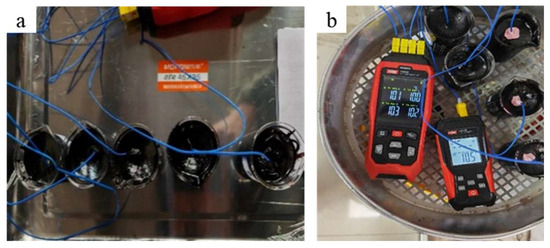
Figure 1.
The thermoregulation test process: (a) specimen with embedded temperature sensor; (b) Thermocouple thermometer and specimen.
3. Results and Discussion
3.1. Properties of MPCM
Figure 2 illustrates the thermal stability and leakage resistance of the MPCMs. Initial heating induced minimal mass loss in PCM-G-5 microcapsules. However, a significant mass reduction occurred between 120 °C and 200 °C, specifically 23.2% at 150 °C and 38.6% at 170 °C. This indicates poor thermal stability below 200 °C, rendering PCM-G-5 particularly susceptible to degradation under the elevated temperatures encountered during asphalt paving operations. TH-ME-5 microcapsules exhibited moderate initial mass loss but maintained superior thermal stability overall. They demonstrated excellent stability within the 100 °C to 150 °C range, with mass losses of only 10.13% at 150 °C and 22.53% at 170 °C. Crucially, TH-ME-5 retained outstanding thermal stability even within the typical temperature range for asphalt mixture mixing. In contrast, PCM-5 microcapsules displayed a more gradual mass loss profile, albeit with onset at a lower temperature. Mass loss reached merely 7.91% at 140 °C and 13.47% at 170 °C, representing the lowest degradation among the three microcapsules within the asphalt mixing temperature window. Notably, however, mass loss for PCM-5 surpassed that of both PCM-G-5 and TH-ME-5 at approximately 400 °C. Comparative analysis reveals that PCM-5 exhibits the highest thermal stability, followed by TH-ME-5, with PCM-G-5 demonstrating the lowest performance.
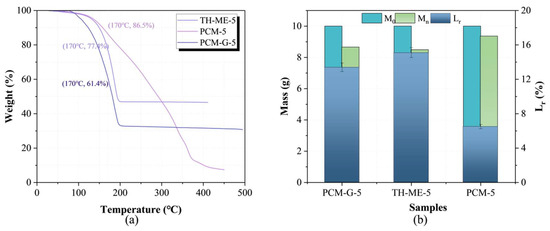
Figure 2.
Thermal stability and permeation resistance of MPCM: (a) TG curves; (b) Mass and Lr.
As shown in Figure 2b, a certain degree of leakage was found in all three microcapsules after 2 h of high-temperature exposure, but the overall leakage was not significant. Specifically, PCM-5 microcapsules had the lowest permeability of only 6.5%, indicating the best anti-permeability performance; PCM-G-5 microcapsules had a slightly higher permeability than PCM-5, which was higher by 6.9%, while the leakage amount of TH-ME-5 microcapsules was about 2.3 times of that of PCM-5; it is worth noting that the difference between the PCM-G-5 and TH-ME-5 microcapsules’ leakage rates differed by only 1.7%. The impermeability of the three types of microcapsules was ranked in descending order as follows: PCM-5, PCM-G-5, TH-ME-5. In previous studies, Dai et al. [17,19] proved that the leakage of phase-change materials would cause serious damage to the high-temperature performance of asphalt. Therefore, the leakage of microcapsules is an important indicator to evaluate whether they are suitable for adding into asphalt. Considering the above results, PCM-5 was selected as the microencapsulated phase-change material for the subsequent modified asphalt test.
3.2. Physical Properties of MPCM-Modified Asphalt
Figure 3 shows the changes in penetration, softening point, and ductility of asphalt modified with microcapsules as the additive content increases. The penetration value of the phase-change-modified asphalt steadily rose with higher microcapsule dosages, reaching a 13% increase at 12% microcapsule content. This increase is due to the leakage of microcapsule core material when PCM-5 is dispersed in asphalt binder under thermal and mechanical shear stress. Hou et al. [20]’s research indicates that after leakage, low-temperature PCMs will fuse with asphalt binders and become their lightweight components. This increases the aromatic and saturate in asphalt, which helps stabilize the asphalt colloid system and enhance permeability. In contrast, the softening point decreased as the microcapsule content increased. Specifically, the softening point dropped by 1.4%, 2.5%, 3.1%, and 4.6% when PCM-5 microcapsules were added at 3%, 6%, 9%, and 12%, respectively. This trend results from a higher frequency of PCM-5 particle breakage during shear mixing, which produces a more flexible asphalt consistency and lowers the softening point. Although the softening point declined, the reduction was relatively small, suggesting that the microcapsule addition has minimal effect on the asphalt’s performance at high service temperatures. Regarding ductility, the addition of microcapsules reduced the stretchability of the base asphalt, indicating a potential impact on its low-temperature performance. However, all modified samples still met the relevant standards. Notably, in SBS-modified asphalt, microcapsule additions of 3%, 6%, 9%, and 12% increased ductility by 4.9%, 12%, 21.7%, and 30.7%, respectively. The rate of ductility improvement rose with increasing microcapsule content, demonstrating that microcapsules enhance the low-temperature ductility and crack resistance of SBS-modified asphalt.
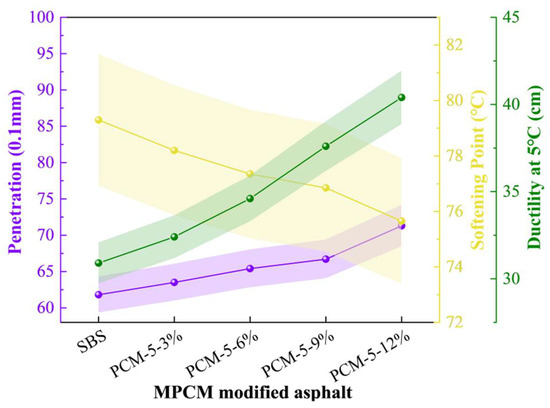
Figure 3.
The results of physical properties of asphalt with PCM-5.
The addition of microcapsules reduces the cohesive forces between asphalt molecules, forming numerous “nodes” that affect ductility and material connectivity. As a result, the asphalt becomes more susceptible to fracture under tensile stress at low temperatures [21]. However, as the microcapsule dosage increases, their distribution within the asphalt mixture becomes more uniform. During this process, leakage of the PCM-5 core material occurs, which raises the saturates fraction in the asphalt blend. This dilution of the asphalt binder improves its ductility and significantly enhances resistance to low-temperature cracking. Additionally, the thermal storage properties of the modified asphalt help release heat at low temperatures, slowing the cooling rate and further improving the binder’s resistance to low-temperature cracking [35].
Table 3 presents the viscosity changes of SBS-modified asphalt containing microcapsules. The results show a decreasing trend in viscosity as the microcapsule content increases. Specifically, at 135 °C, adding 3%, 6%, 9%, and 12% microcapsules reduced the viscosity by 11.3%, 21.8%, 28.5%, and 31.1%, respectively. At 175 °C, the corresponding viscosity reductions were 2.8%, 5.6%, 8.3%, and 11.1%. These findings indicate that the incorporation of PCM-5 phase-change microcapsules significantly lowers the viscosity of SBS-modified asphalt.

Table 3.
Brookfield viscosity of MPCM modified asphalt.
3.3. G*/(Sinδ) and VTS of MPCM-Modified Asphalt
Figure 4 illustrates the behavior of SBS-modified asphalt blended with PCM-5 microcapsules. As the temperature increases, the composite shear modulus of the asphalt gradually decreases. However, the rate of this decline slows down and eventually stabilizes. The differences in rutting factor among asphalt samples containing 3%, 6%, 9%, and 12% PCM-5 are relatively minor. Nevertheless, the rutting factor shows a consistent downward trend with increasing PCM-5 content. Specifically, at 46 °C, the rutting factors decreased by 6.54%, 18.38%, and 26.37% for increasing dosages, indicating a weakening of high-temperature performance. Although the composite shear modulus of asphalt is generally associated with improved high-temperature performance and enhanced resistance to deformation, the incorporation of PCM-5 leads to a reduction in this modulus. This suggests that PCM-5 microcapsules exert a softening effect on the asphalt matrix, thereby compromising the high-temperature stability of SBS-modified asphalt.
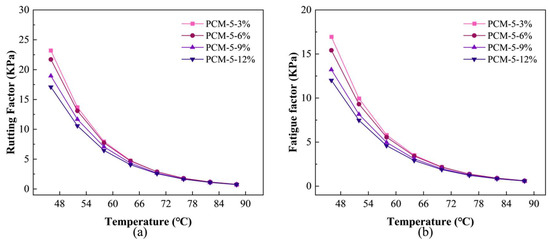
Figure 4.
Temperature scanning test results of MPCM modified asphalt: (a) Rutting factor; (b) Fatigue factor.
Figure 4b demonstrates that the fatigue factor of temperature-modified phase-change asphalt decreases continuously as the dosage of PCM-5 microcapsules increases. This decline gradually levels off and converges beyond 70 °C, with the differences in fatigue factor among various dosages becoming less pronounced at higher temperatures. Notably, significant reductions in the fatigue factor were observed at 6% and 12% microcapsule content. This is attributed to the rupture of some microcapsules, which leads to the release of the encapsulated phase-change material that subsequently blends with the asphalt binder. This behavior supplements the light components of the asphalt, increases its fluidity, and consequently enhances its fatigue resistance. Overall, the incorporation of PCM-5 microcapsules effectively reduces the fatigue factor across the full temperature range, and the extent of this reduction exhibits a positive correlation with the microcapsule dosage. These findings suggest that PCM-5 microcapsules play a substantial role in enhancing the fatigue resistance of phase-change modified asphalt binders.
The dynamic shear modulus and loss angle of different types of phase-change thermoregulated asphalts were analyzed, and the corresponding complex viscosities were calculated [36,37]. Subsequently, the viscosity-temperature index of the phase-change thermoregulated asphalt was derived using Equation (2).
Here, , represent two different temperature points, and and denote the dynamic viscosities at these temperatures. Considering the non-Newtonian behavior of asphalt, the equivalent viscosity of the temperature-regulated asphalt at different dosages is calculated using the Cox–Merz conversion method to ensure accuracy. This conversion is expressed in Equation (3).
where is the equivalent viscosity, Pa; is the phase angle, °; is the complex shear modulus, KPa; and is the angular frequency, rad/s.
PCM-5 modified asphalt with a 6% dosage was selected as the sample, and its equivalent viscosity was calculated. The detailed results are presented in Table 4.

Table 4.
PCM-5-6% phase-change asphalt equivalent viscosity.
Based on the calculation results for SBS temperature-modified asphalt with a 6% dosage shown in the table, a linear fit was performed using temperature as the horizontal coordinate and the double logarithm of the equivalent viscosity, lg(lg()), as the vertical coordinate. The slope of this fitted line represents the viscosity–temperature index. The results are presented in Figure 5.
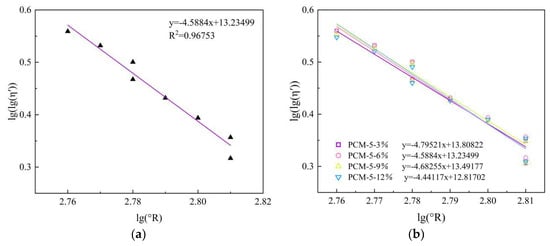
Figure 5.
MPCM modified asphalt VTS linear fitting results: (a) Fitted curve; (b) Fitted curves for all dosages.
Figure 5 shows that the phase-change modulated asphalt exhibits a good linear relationship between Rankine temperature and equivalent viscosity. The slope value of the linear fit is −4.5884 for the 6% dosage of moderated asphalt, and its correlation coefficient reaches 0.96753. The viscosity temperature index and linear fit correlation coefficient data of various types of moderated asphalt, obtained by applying the same means to other asphalt samples, are summarized in Table 5. Observing Table 5 and Figure 5, it can be seen that the absolute value of the value of the VTS of the modified asphalt shows a decreasing trend with the increase in the dosage of PCM-5. In asphalt materials, a higher absolute value of VTS implies a higher sensitivity to temperature, which means that temperature fluctuations have a more significant effect on its performance. It can be seen that the addition of PCM-5 microcapsules can significantly reduce the temperature sensitivity of asphalt and enhance its stability performance under different temperature conditions, which is related to the latent heat capacity of microcapsules.

Table 5.
MPCM-modified asphalt viscosity temperature index.
3.4. Creep Properties of MPCM-Modified Asphalt
Figure 6 presents the creep stiffness (S) and m-value of MPCM-modified asphalt. The addition of PCM-5 reduces the creep stiffness of SBS-modified asphalt, with greater reductions observed at higher dosages. At •18 °C, each 3% increase in PCM-5 content led to decreases in S of 27.9%, 8.7%, 35.4%, and 11.1%, respectively. At •24 °C, the corresponding decreases were 2.4%, 10.4%, 17.9%, and 31.4%. These results indicate that PCM-5 reduces the brittleness of asphalt and effectively improves its viscoelasticity and toughness in cold environments, thereby significantly enhancing its low-temperature crack resistance. PCM-5 also increases the creep rate (m-value) of SBS-modified asphalt, with m-values rising as the microcapsule content increases. At •18 °C, each 3% increment in PCM-5 raised the m-value by 1.4%, 1.5%, 6.3%, and 2.4%, respectively. At •24 °C, the increases were 17.1%, 1.2%, 7.1%, and 2.6%. These findings demonstrate that PCM-5 microcapsules significantly enhance the stress relaxation capacity of SBS-modified asphalt under low-temperature conditions. At •12 °C, creep stiffness and m-value measurements were not obtained for any PCM-modified asphalt samples due to beam deflections exceeding 5 mm. During the preparation of phase-change asphalt, higher temperatures are required to ensure uniform dispersion of PCM-5 microcapsules within the SBS-modified asphalt matrix. However, these elevated temperatures increase the likelihood of microcapsule rupture, resulting in a softer asphalt blend and a corresponding reduction in low-temperature crack resistance. Thus, while higher processing temperatures are necessary for effective PCM-5 dispersion, increased microcapsule content also raises the risk of rupture, leading to greater softening and reduced brittleness at low temperatures [38].
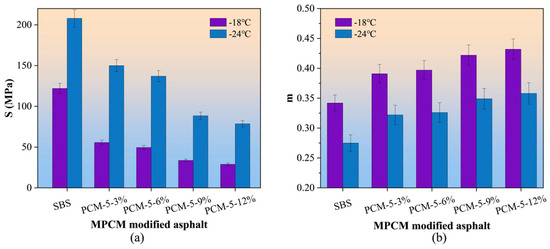
Figure 6.
Creep strength and creep rate: (a) S value; (b) m value.
3.5. Temperature Regulating Properties of MPCM-Modified Asphalt
The results of the temperature regulation test are presented in Figure 7. The addition of PCM-5 slowed the cooling rate of SBS-modified asphalt under low-temperature conditions. Using the temperature at 30 min as a reference, phase-change-modified asphalt containing 3%, 6%, 9%, and 12% PCM-5 showed temperature increases of 3.9 °C, 1.3 °C, 4.9 °C, and 2.0 °C, respectively, compared to pure SBS-modified asphalt. After being maintained at •19 °C for 84 min, the recorded temperatures of pure SBS-modified asphalt and PCM-5-modified asphalt with different dosages were •18.6 °C, •17.8 °C, •17.2 °C, •16.9 °C, and •16.0 °C, respectively. Within the phase-change temperature range of PCM-5 microcapsules, a temperature gradient gradually developed between the phase-change-modified asphalt and the SBS-modified asphalt as the internal temperature changed. Starting from 60 min, the temperature of the modified asphalt containing phase-change material gradually approached that of the SBS-modified asphalt, with the temperature difference decreasing continuously until equilibrium was reached. This indicates that the phase-change process within the asphalt had completed and the material no longer released heat under low-temperature conditions, resulting in a decline in thermal regulation efficiency. Overall, PCM-5 microcapsules demonstrated excellent performance in effectively reducing the internal temperature of the asphalt and delaying the occurrence of its minimum temperature.
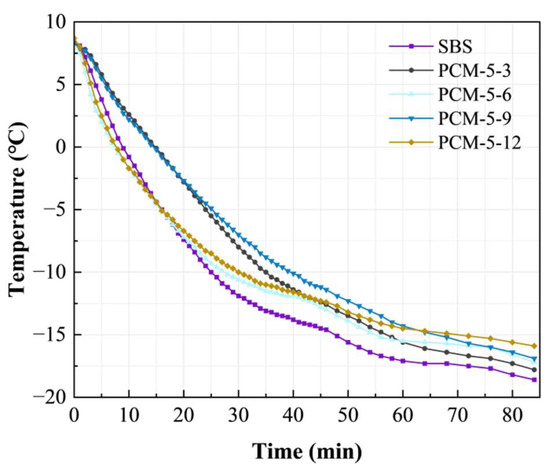
Figure 7.
Temperature versus time curve of MPCM-modified asphalt.
4. Conclusions
This study rapidly optimized microcapsules through thermal stability and leakage testing, and investigated their effects on the performance of SBS modified asphalt. The main findings and conclusions are summarized as follows:
- PCM-5 outperformed the PCM-G-5 and TH-ME-5 in both thermal stability and resistance to leakage. It withstood high temperatures typical of asphalt production, showing only 13.47% mass loss and a permeability of 6.5% at 170 °C, demonstrating strong structural integrity and effective latent heat containment.
- As PCM-5 dosage increased, penetration and ductility of the modified asphalt improved significantly, while the softening point showed only a slight decrease. These results suggest that PCM-5 enhances low-temperature flexibility without compromising high-temperature performance. Viscosity measurements further indicated improved workability and flow characteristics with microcapsule addition.
- Rheological tests showed that PCM-5 reduced the complex shear modulus and rutting factor, indicating diminished stiffness at high temperatures. However, the decreasing absolute value of the VTS with increasing PCM content suggests a more stable thermal response across temperature fluctuations.
- BBR testing confirmed notable improvements in low-temperature performance. PCM-5 significantly lowered creep stiffness and increased the m-value, particularly at •24 °C, where it demonstrated strong stress relaxation capability.
- Temperature control experiments demosnstrated that the latent heat stored in PCM-5 effectively slowed the cooling rate of the asphalt and delayed the onset of minimum temperatures. This thermal-buffering effect contributes to greater temperature stability in cold climates, extending the operational reliability of asphalt pavements.
This study focuses on the influence of microcapsules on the rheological properties of asphalt binder, and lacks the research on the performance of the mixture. In the future, the application of microcapsules in the pavement and mechanical properties of the asphalt mixture should be further explored.
Author Contributions
Writing—original draft preparation, L.Z.; writing—original draft preparation, J.W. (Junmao Wang); writing—review and editing, J.W. (Jinhua Wu); data curation, R.Z.; validation, funding acquisition, Y.G.; software, H.S.; methodology, X.L.; software, K.L. All authors have read and agreed to the published version of the manuscript.
Funding
This study is financially supported by the Department of Transport of Shaanxi Province (24-87K) and Shaanxi Sanqin Road & Bridge Co., Ltd. (220221230444).
Institutional Review Board Statement
Not applicable.
Informed Consent Statement
Not applicable.
Data Availability Statement
Data will be made available on request.
Conflicts of Interest
Authors Liming Zhang and Junmao Wang were employed by Shaanxi Sanqin Road & Bridge Co., Ltd., Xi’an Communication Investment Group Co., Ltd. The authors declare that they have no known competing financial interests or personal relationships that could have appeared to influence the work reported in this paper.
References
- Guo, Y.; Yao, C.; Shen, A.; Chen, Q.; Wei, Z.; Yang, X. Feasibility of rapid-regeneration utilization in situ for waste cement-stabilized macadam. J. Clean. Prod. 2020, 263, 121452. [Google Scholar] [CrossRef]
- Pei, Y.; Guo, Y.; Shen, A.; Mao, S. Uniformity evaluation of asphalt pavements in hot and humid areas based on ground-penetrating radar. Constr. Build. Mater. 2023, 384, 131432. [Google Scholar] [CrossRef]
- Wang, X.; Ma, B.; Li, S.; Si, W.; Wei, K.; Zhang, H.; Zhou, X.; Fang, Y.; Kang, X.; Shi, W. Review on application of phase change materials in asphalt pavement. J. Traffic Transp. Eng. (Engl. Ed.) 2023, 10, 185–229. [Google Scholar] [CrossRef]
- Ismail, K.A.R.; Lino, F.A.M.; Machado, P.L.O.; Teggar, M.; Arıcı, M.; Alves, T.A.; Teles, M.P.R. New potential applications of phase change materials: A review. J. Energy Storage 2022, 53, 105202. [Google Scholar] [CrossRef]
- Maung, H.M.M.; Zhang, X.; Li, X.; Liu, F.; Tun, S.H. Enhancing the performance of polymer-modified asphalt binders using warm mix technology and additives. Constr. Build. Mater. 2025, 490, 142491. [Google Scholar] [CrossRef]
- Jin, X.; Ren, D.; Wu, H.; Kong, H.; Yang, Q.; Zhou, T.; Zhao, Z.; Li, J. Enhancing compatibility of waste tire rubber powder in asphalt: A comparative study of acid surface activation and molecular dynamics insights. Constr. Build. Mater. 2025, 478, 141417. [Google Scholar] [CrossRef]
- Afshin, A.; Behnood, A. Nanomaterials in asphalt pavements: A state-of-the-art review. Clean. Waste Syst. 2025, 10, 100214. [Google Scholar] [CrossRef]
- Hamedi, G.H.; Zarrinfam, J.; Asadi, A.H. Effect of surface free energy and mix design parameters on low-temperature cracking of hot mix asphalt. J. Traffic Transp. Eng. (Engl. Ed.) 2025, 12, 477–496. [Google Scholar] [CrossRef]
- Issa, M.A.; Goli, A.; Revelli, V.; Ali, A.; Mehta, Y. Influence of softening agents on low and intermediate temperature cracking properties of highly polymer modified asphalt binders. Constr. Build. Mater. 2025, 490, 142404. [Google Scholar] [CrossRef]
- Khan, D.; Khan, R.; Khan, M.T.; Alam, M.; Hassan, T. Performance of hot-mix asphalt using polymer-modified bitumen and marble dust as a filler. J. Traffic Transp. Eng. (Engl. Ed.) 2023, 10, 385–398. [Google Scholar] [CrossRef]
- Demchuk, Y.; Gunka, V.; Sidun, I.; Korchak, B.; Donchenko, M.; Drapak, I.; Poliuzhyn, I.; Pyshyev, S. Study of Road Bitumen Operational Properties Modified with Phenol–Cresol–Formaldehyde Resin. Resources 2025, 14, 91. [Google Scholar] [CrossRef]
- Salvo-Ulloa, D.; Indacoechea-Vega, I.; Ossio, F.; Castro-Fresno, D. Critical factors for the selection of phase change materials for asphalt mixtures: A systematic review. Clean. Eng. Technol. 2025, 26, 100936. [Google Scholar] [CrossRef]
- Zhang, D.; Bu, W.; Wang, Q.; Liu, P.; Shao, Z.; Liu, X.; Li, G.; Zhou, Y. A review of recent developments and challenges of using phase change materials for thermoregulation in asphalt pavements. Constr. Build. Mater. 2023, 400, 132669. [Google Scholar] [CrossRef]
- Hou, Y.; Ma, F.; Fu, Z.; Li, C.; An, Q.; Zhu, C.; Dai, J. Encapsulation of stearic-palmitic acid in alkali-activated coconut shell and corn cob biochar to optimize energy storage. J. Energy Storage 2023, 66, 107418. [Google Scholar] [CrossRef]
- Dai, J.; Ma, F.; Fu, Z.; Li, C.; Wu, D.; Shi, K.; Dong, W.; Wen, Y.; Jia, M. Assessing the direct interaction of asphalt binder with stearic acid/palmitic acid binary eutectic phase change material. Constr. Build. Mater. 2022, 320, 126251. [Google Scholar] [CrossRef]
- Jia, M.; Sha, A.; Jiang, W.; Wang, W.; Yuan, D. Adhesion, rheology and temperature-adjusting performance of polyurethane-based solid–solid phase change asphalt mastics subjected to laboratory aging. Mater. Struct. 2023, 56, 57. [Google Scholar] [CrossRef]
- Ma, F.; Hou, Y.; Fu, Z.; Qin, W.; Tang, Y.; Dai, J.; Wang, Y.; Peng, C. Microencapsulated binary eutectic phase change materials with high energy storage capabilities for asphalt binders. Constr. Build. Mater. 2023, 392, 131814. [Google Scholar] [CrossRef]
- Çaktı, K.; Erden, İ.; Gündüz, S.; Hassanpour-Kasanagh, S.; Büyük, B.; Alkan, C. Investigation of the effectiveness of microencapsulated phase change materials for bitumen rheology. Int. J. Energy Res. 2022, 46, 23879–23892. [Google Scholar] [CrossRef]
- Dai, J.; Ma, F.; Fu, Z.; Li, C.; Jia, M.; Shi, K.; Wen, Y.; Wang, W. Applicability assessment of stearic acid/palmitic acid binary eutectic phase change material in cooling pavement. Renew. Energy 2021, 175, 748–759. [Google Scholar] [CrossRef]
- Hou, Y.; Ma, F.; Fu, Z.; Dai, J.; Tang, Y.; Qiang, A.; Jiang, X.; Wang, Z. Low-temperature aliphatic eutectic phase change materials for asphalt: Design and characterization. Constr. Build. Mater. 2024, 414, 134852. [Google Scholar] [CrossRef]
- Wang, X.; Huan, X.; Qi, C.; Li, G.; Yao, Y.; Chen, H.; Kuang, D. Unveiling the influence of asphalt on the thermal storage behavior of microencapsulated phase change materials through non-isothermal crystallization kinetics. Fuel 2025, 394, 135101. [Google Scholar] [CrossRef]
- Ma, B.; Chen, S.-s.; Ren, Y.-z.; Zhou, X.-y. The thermoregulation effect of microencapsulated phase-change materials in an asphalt mixture. Constr. Build. Mater. 2020, 231, 117186. [Google Scholar] [CrossRef]
- Du, X.; Xin, C.; Zhao, Y.; Qiao, H.; Chen, J.; Xu, R. Improvement of phase change modified asphalt thermal conductivity by phase change micro-capsule wall material. Constr. Build. Mater. 2025, 487, 142121. [Google Scholar] [CrossRef]
- Cunha, S.; Santos, L.; Aguiar, J. Recovery paraffin wax waste as phase change material for application in cement mortars for exterior coatings of buildings. J. Energy Storage 2025, 129, 117343. [Google Scholar] [CrossRef]
- Sathishkumar, A.; Sundaram, P.; Prabakaran, R.; Kim, S.C. Graphene based fatty acid phase change material as an alternative to water: An experimental investigation on thermal energy storage characteristics. Colloids Surf. A Physicochem. Eng. Asp. 2025, 715, 136589. [Google Scholar] [CrossRef]
- Wang, X.; Ma, B.; Wei, K.; Zhang, W. Thermal stability and mechanical properties of epoxy resin/microcapsule composite phase change materials. Constr. Build. Mater. 2021, 312, 125392. [Google Scholar] [CrossRef]
- Wang, X.; Ma, B.; Wei, K.; Si, W.; Kang, X.; Fang, Y.; Zhang, H.; Shi, J.; Zhou, X. Thermal storage properties of polyurethane solid-solid phase-change material with low phase-change temperature and its effects on performance of asphalt binders. J. Energy Storage 2022, 55, 105686. [Google Scholar] [CrossRef]
- Lu, J.; Xu, S.; Li, C.; Fu, C.; Gao, M.; Wang, Z.; Yang, F.; Zhou, G.; Li, R.; Ling, T. The latest research progress of polyurethane modified asphalt binder: Synthesis, characterization, and applications. Int. J. Adhes. Adhes. 2025, 140, 104035. [Google Scholar] [CrossRef]
- Hou, Y.; Ma, F.; Fu, Z.; Dai, J.; Tang, Y.; Wang, T.; Dong, W.; Wen, Y.; Shi, K. Diffusion behavior of phase change materials at the interface of aged asphalt binder based on molecular dynamics simulation and experimental analysis. J. Mol. Liq. 2025, 419, 126758. [Google Scholar] [CrossRef]
- Wang, S.; Wei, K.; Shi, W.; Cheng, P.; Shi, J.; Ma, B. Study on the rheological properties and phase-change temperature regulation of asphalt modified by high/low-temperature phase change material particles. J. Energy Storage 2022, 56, 105970. [Google Scholar] [CrossRef]
- Fu, Z.; Hou, Y.; Ma, F.; Fu, Z.; Cui, J.; Liu, Z.; Liu, J. Investigation of rheological properties of asphalt modified with low-temperature microencapsulated eutectic phase change materials. Case Stud. Constr. Mater. 2024, 20, e03201. [Google Scholar] [CrossRef]
- Ren, Y.; Hao, P. Modification mechanism and enhanced low-temperature performance of asphalt mixtures with graphene-modified phase-change microcapsules. Constr. Build. Mater. 2022, 320, 126301. [Google Scholar] [CrossRef]
- JTG F40-2004; Technical Specifications for Construction of Highway Asphalt Pavements. China Communications Press: Beijing, China, 2004.
- JTG E20-2011; Standard Test Methods of Bitumen and Bituminous Mixtures for Highway Engineering. China Communications Press: Beijing, China, 2011.
- Ma, F.; Dai, J.; Zou, Y.; Fu, Z.; Liu, J.; Yang, P.; Hou, Y.; Jiang, X.; Li, S. Preparation of low-temperature microencapsulated phase change materials and evaluation of their effect on the properties of asphalt binders. Constr. Build. Mater. 2025, 458, 139719. [Google Scholar] [CrossRef]
- Betancourt-Jimenez, D.; Montoya, M.; Haddock, J.; Youngblood, J.P.; Martinez, C.J. Regulating asphalt pavement temperature using microencapsulated phase change materials (PCMs). Constr. Build. Mater. 2022, 350, 128924. [Google Scholar] [CrossRef]
- Wang, X.; Qi, C.; Han, S.; Fan, L.; Huan, X.; Chen, H.; Kuang, D. Thermal storage kinetics of phase-change modified asphalt: The role of shell design and asphalt influence. Energy 2025, 322, 135660. [Google Scholar] [CrossRef]
- Jiang, X.; Ma, F.; Fu, Z.; Dai, J.; Yang, P.; Hou, Y.; Hao, Y.; Wen, Y.; Dong, W.; Shi, K. Multi-scale optimization of high-enthalpy encapsulated ternary eutectic phase change materials: Towards sustainable asphalt pavements with enhanced thermal management. Chem. Eng. J. 2025, 518, 164720. [Google Scholar] [CrossRef]
Disclaimer/Publisher’s Note: The statements, opinions and data contained in all publications are solely those of the individual author(s) and contributor(s) and not of MDPI and/or the editor(s). MDPI and/or the editor(s) disclaim responsibility for any injury to people or property resulting from any ideas, methods, instructions or products referred to in the content. |
© 2025 by the authors. Licensee MDPI, Basel, Switzerland. This article is an open access article distributed under the terms and conditions of the Creative Commons Attribution (CC BY) license (https://creativecommons.org/licenses/by/4.0/).